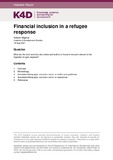| dc.contributor.author | Megersa, Kelbesa | |
| dc.coverage.spatial | Uganda | en |
| dc.date.accessioned | 2021-10-13T15:24:34Z | |
| dc.date.available | 2021-10-13T15:24:34Z | |
| dc.date.issued | 2021-08-18 | |
| dc.identifier.citation | Megersa, K. (2021). Financial inclusion in a refugee response. K4D Helpdesk Report 1023. Brighton, UK: Institute of Development Studies. DOI: 10.19088/K4D.2021.122 | en |
| dc.identifier.uri | https://opendocs.ids.ac.uk/opendocs/handle/20.500.12413/16884 | |
| dc.description.abstract | The growing scope, frequency, and complexity of forced displacement, both inside and outside of countries, has pushed donors and other development groups to rethink their approaches to humanitarian crises, particularly on refugee response. Financial inclusion is widely regarded as a particularly critical tool that development organisations can employ to mitigate the catastrophic impact of humanitarian crises on refugees. Financial inclusion would provide a wide range of financial products – such as savings, remittances, loans, and insurance – to both refugees and citizens of host countries, which are critical for disadvantaged populations seeking to mitigate shocks, acquire assets, and support local economic development. Changes in how humanitarian aid is distributed are opening the path for greater financial inclusion. Donors and humanitarian organisations are shifting away from emergency cash transfers and toward digital payments via electronic cards. This opens new opportunities to connect refugees and displaced people to a bigger pool of financial services. This rapid literature review summarises the available evidence on toolkits that assist the response by humanitarian and development agencies to financial inclusion of refugees. In addition to the documents defined explicitly as “toolkits”, it also includes reports and online articles which contain useful guidance, since there were few “toolkits” available. Generally, there is lack of resources that directly address the query, i.e., “financial inclusion” in a “refugee response” context. Although there is a growing literature and evidence on the financial inclusion theme, much of it does not directly relate to refugees. Furthermore, most guidance notes and toolkits prepared for refugee response by humanitarian/development agencies do not directly and explicitly deal with financial inclusion, but rather focus on operational and programming issues of wider relief responses. The review is presented as an annotated bibliography format and includes toolkits, guidance notes, technical reports, and online articles by humanitarian and international development agencies. | en |
| dc.description.sponsorship | Foreign, Commonwealth & Development Office (FCDO) | en |
| dc.language.iso | en | en |
| dc.publisher | Institute of Development Studies | en |
| dc.relation.ispartofseries | K4D Helpdesk Report;1023 | |
| dc.rights.uri | https://www.nationalarchives.gov.uk/doc/open-government-licence/version/3/ | en |
| dc.subject | Aid | en |
| dc.subject | Finance | en |
| dc.subject | Gender | en |
| dc.subject | Social Protection | en |
| dc.title | Financial Inclusion in a Refugee Response | en |
| dc.type | Helpdesk | en |
| dc.rights.holder | © Crown copyright 2021 | en |
| dc.identifier.doi | 10.19088/K4D.2021.122 | |
| dcterms.dateAccepted | 2021-08-18 | |
| rioxxterms.funder | Default funder | en |
| rioxxterms.identifier.project | K4D | en |
| rioxxterms.version | VoR | en |
| rioxxterms.versionofrecord | 10.19088/K4D.2021.122 | en |
| rioxxterms.funder.project | 0986883a-6d0f-4bb8-9c46-5e0682934d65 | en |

